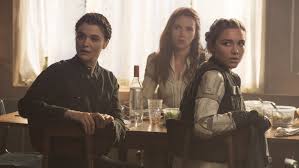🎬 Black Widow (2021)

“Black Widow” (2021): A Deep Dive into Natasha Romanoff’s Legacy
After years of anticipation, Black Widow (2021) finally brings Natasha Romanoff, one of the Marvel Cinematic Universe’s most beloved characters, into the spotlight. Directed by Cate Shortland, the film serves as a long-overdue solo outing for Scarlett Johansson’s Black Widow, giving fans a chance to delve deeper into the complexities of her character. Set between the events of Captain America: Civil War and Avengers: Infinity War, this spy-thriller-action hybrid offers a blend of high-octane sequences, heartfelt moments, and explorations of identity and family.
A Narrative of Redemption and Family
Black Widow begins with a flashback to Natasha Romanoff’s childhood, revealing her life in an undercover Soviet family living in Ohio during the 1990s. Alongside her younger sister figure, Yelena Belova (Florence Pugh), Natasha’s idyllic suburban life is shattered when their “parents,” Alexei Shostakov (David Harbour) and Melina Vostokoff (Rachel Weisz), abruptly uproot them for a mission that leads to their separation and eventual placement into the notorious Red Room.
Fast forward to the main timeline, Natasha is on the run following the events of Civil War. She reconnects with Yelena, and the two embark on a mission to dismantle the Red Room once and for all, confronting their shared trauma and a sinister figure from their past—Dreykov (Ray Winstone), the manipulative overseer of the Red Room program.
The heart of the film lies in its exploration of found family. Natasha, Yelena, Alexei, and Melina form an unconventional and fractured family unit that wrestles with themes of betrayal, love, and reconciliation. This dynamic provides a refreshing emotional depth, offering audiences a different kind of superhero story, one less about saving the world and more about healing.
Character Development: Giving Natasha Her Due
For over a decade, Natasha Romanoff has been a key figure in the MCU, yet her backstory remained shrouded in mystery. Black Widow finally peels back the layers of her character, revealing a woman haunted by her past yet determined to make amends.
Scarlett Johansson gives a nuanced performance, balancing Natasha’s hardened exterior with her vulnerability and guilt. The film showcases her evolution from a lone operative to someone who values connection and purpose. While it doesn’t rewrite her arc from previous films, it enriches her character by spotlighting her personal struggles and sacrifices.
However, the real standout is Florence Pugh as Yelena Belova. Yelena’s wit, sarcasm, and raw emotional honesty make her a scene-stealer, and Pugh effortlessly infuses her with both comedic charm and emotional weight. Yelena’s journey mirrors Natasha’s in many ways, but her biting humor and younger-sibling energy bring a fresh perspective to the story. Her mockery of Natasha’s superhero poses and penchant for casual violence add levity to an otherwise heavy narrative.
David Harbour’s Alexei, the Red Guardian, provides much of the film’s comedic relief. A washed-up Soviet-era super-soldier clinging to his glory days, Alexei is equal parts endearing and absurd. Meanwhile, Rachel Weisz’s Melina is more reserved but no less compelling, playing a pivotal role in the family’s reunion and mission.
Themes of Trauma, Identity, and Liberation
At its core, Black Widow is a story about confronting the past and reclaiming agency. The film doesn’t shy away from the horrors of Natasha’s upbringing, delving into the psychological and physical abuse endured by the girls in the Red Room. The narrative emphasizes themes of trauma and healing, as Natasha and Yelena work to dismantle the system that stripped them of their autonomy.
The film also explores identity, particularly through Yelena’s perspective. Unlike Natasha, who found a sense of belonging with the Avengers, Yelena is still grappling with her sense of self. Her bitterness and longing for a normal life provide a poignant counterpoint to Natasha’s hard-earned peace.
The liberation of the Red Room’s other Widows serves as a metaphor for breaking free from oppression and control. While the climax leans heavily on action, the resolution is deeply tied to this theme, emphasizing Natasha’s role not just as a hero but as a liberator.
Action Sequences: Thrilling but Familiar
True to its genre, Black Widow delivers plenty of adrenaline-pumping action. The hand-to-hand combat sequences are particularly well-choreographed, showcasing Natasha’s and Yelena’s lethal skill sets. From a tense apartment fight in Budapest to a motorcycle chase through crowded streets, the film excels at creating visceral, grounded action.
The final act, however, leans more into blockbuster spectacle, featuring an explosive aerial set piece that feels slightly at odds with the more intimate tone of the story. While thrilling, this CGI-heavy climax lacks the emotional resonance of the earlier, more personal conflicts.
Taskmaster, a formidable adversary with the ability to mimic her opponents’ fighting styles, is a visually striking antagonist. However, the character’s arc feels underdeveloped, leaving many fans wanting more depth and exploration of their backstory.
The Humor: A Balanced Tone
One of the strengths of Black Widow is its ability to balance dark themes with humor. Yelena’s quips about Natasha’s dramatic “superhero landing” and Alexei’s delusional belief that Captain America views him as a rival bring levity to the film without undercutting its emotional weight. These moments of humor make the characters more relatable, reminding audiences that even superheroes can have awkward family dinners and sibling rivalries.
Cinematic Aesthetics
Cate Shortland brings a distinct visual style to Black Widow, blending gritty realism with stylized action. The film’s cinematography captures the cold, harsh environments of Natasha’s world, from the desolate landscapes of Norway to the shadowy interiors of the Red Room. The use of practical effects in the fight sequences adds a visceral edge, grounding the action in reality.
The costume design also deserves praise, particularly Natasha’s updated white suit, which feels both functional and iconic. Yelena’s tactical gear, complete with her ever-present utility vest (with “so many pockets”), is another subtle yet effective piece of character storytelling.
Strengths and Weaknesses
Strengths:
- Character Focus: The film offers a deeper exploration of Natasha’s character, giving her a richly deserved spotlight.
- Family Dynamics: The interactions between Natasha, Yelena, Alexei, and Melina are the emotional core of the film, providing both humor and heart.
- Florence Pugh’s Performance: Pugh’s Yelena is a breakout star, bringing fresh energy to the MCU.
- Themes of Liberation: The film’s exploration of trauma and agency adds depth to its narrative.
Weaknesses:
- Underwhelming Villain: Taskmaster and Dreykov lack the complexity of the MCU’s best antagonists, leaving their motivations and arcs feeling flat.
- Pacing Issues: While the first two acts are engaging, the final act feels rushed and overly reliant on spectacle.
- Missed Opportunities: As Natasha’s first and only solo film, Black Widow could have delved even deeper into her psyche and relationships, particularly with the Avengers.

A Long-Overdue Goodbye
Black Widow serves as both a prequel and a farewell to Natasha Romanoff. For fans still mourning her sacrifice in Avengers: Endgame, the film offers closure, showcasing her heroism and humanity. While it doesn’t completely rewrite her story, it fills in important gaps and cements her legacy as one of the MCU’s most compelling characters.
The film also sets the stage for the future, with Yelena poised to carry on Natasha’s mantle in her own way. Florence Pugh’s presence in the MCU is an exciting prospect, and her dynamic with Natasha ensures that the spirit of Black Widow will live on.
Conclusion
Black Widow (2021) is a fitting tribute to Natasha Romanoff, blending thrilling action with heartfelt storytelling. While it doesn’t break new ground in the superhero genre, it succeeds in giving the character the spotlight she has long deserved. With its focus on family, identity, and redemption, the film stands out as a more personal and emotionally resonant chapter in the MCU.
For fans of Natasha Romanoff, Black Widow is both a satisfying standalone story and a bittersweet goodbye. And for those new to the character, it serves as a compelling introduction to one of the MCU’s most complex heroes.
Rating: 8/10











